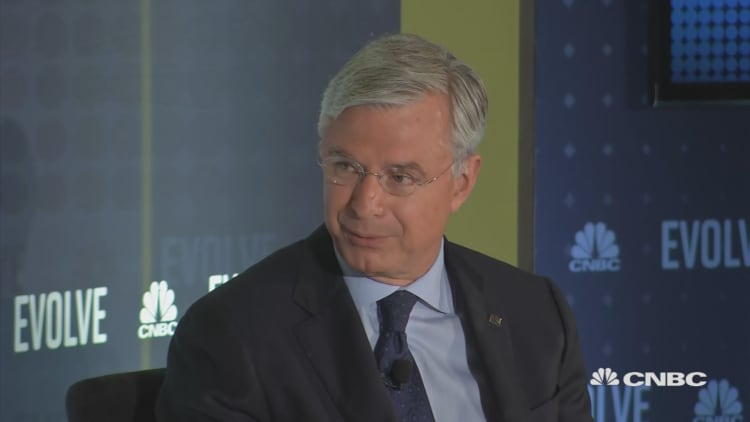CNBC's Evolve event was held earlier this week in New York City featuring keynote presentations and panel discussions on how legacy companies can adapt, innovate and evolve amid rapid technological advances and demographic change. Here are some edited excerpts from leaders in retail, media and health care.
Where Hubert Joly found the success inside Best Buy
Many skeptics believed Best Buy was on the way to becoming the next Circuit City, an Amazon retail casualty. But under the leadership of chairman Hubert Joly, who recently gave up the CEO title, Best Buy stock is up 258%.
"Crazy or suicidal," was how Joly referred to the way people viewed his decision to attempt a Best Buy turnaround. But he saw existing assets that others either couldn't or wouldn't. Starting with the company's workers.
Joly gave associates the ability to match prices in stores to those found online, helping to prevent shoppers from checking out its products in stores before buying it more cheaply on the web. That was part of a larger focus on driving sales rather than slashing expenses, with the latter approach being typical of turnaround executives.
"My personal philosophy of turnaround is you first focus on increasing revenue," Joly said at CNBC Evolve.
And he still found room to cut costs by roughly $2 billion without endangering employee morale. "Eighty percent of cost structure is not salary."
The new margin of error for retailers: There is none
Shoppers have won. That doesn't mean retailers have lost, but it does mean they have no room to make any mistakes if they want to stay in favor.
"The tolerance for a bad experience has gone to zero," said Enjoy CEO, former Apple Retail SVP and Former JCPenney CEO Ron Johnson. "You've got to be great every time."
"I think it's better to be a consumer today in a lot of categories," said Jeff Raider, who co-founded both glasses maker Warby Parker and men's care company Harry's, recently acquired by Schick owner Edgewell for close to $1.4 billion.
Susan Tynan, the founder and CEO of framing start-up Framebridge, explained that consumers are looking for a seamless shopping experience. That's one reason why Framebridge, which started online in 2014, recently opened its first two bricks-and-mortar stores in the U.S. She said basket sizes are up 50% when people visit a Framebridge store instead of shopping online.
"We see consumers really driven by ease."
How The New York Times became worth more than Trump
The New York Times Company CEO Mark Thompson has reason to hold a grudge against President Donald Trump. As leader of one of the world's most important news companies, he called President Trump's attacks on journalists "hostile," "stupid" and "dangerous." But he has exacted revenge in a way that hits Trump with something harder than words, and where it counts: business success.
Shares of the Times have risen over 200% since Trump was elected and 300% since Thompson took control in 2012. At that time, amid declining ad sales and income, the newspaper company was worth roughly $1 billion. Now it is worth close to $6 billion. Forbes ($3.1 billion) and Bloomberg ($2.8 billion) estimate Trump's wealth at just over half the Times's current value.
"Our model is a very simple model which is we should invest in great content," Thompson said. "The future of journalism is make more journalism ... and then figure out smart ways to put that in front of people and asking them to support that journalism."
Knowing the company had to evolve if it wanted to survive, Thompson adopted what he calls a value-based leadership approach.
"Once you convince people that you really believe in the fundamentals of the product and the values, then you earn permission to start talking about those things where you do need to make changes," Thompson said. "The trick is not to try and come up with a strategy and impose it on an organization."
Stress can cost workers $1,500 a year. It pays for companies to fix that.
When Mark Bertolini took over as Aetna's CEO in April 2011, shares of the health insurance company were trading just over $30. When the company was sold to CVS in 2017, the pharmacy giant paid more than $212 a share in a $69 billion acquisition.
Part of his success in growing the health insurer involved taking a hard look at its own workers' struggles. An internal Aetna study found that employees in the top 20% of stress levels had $1,500 a year more in health-care costs.
To help fight this, Bertolini implemented several programs that upper-level management thought were crazy, from yoga and sleep management to allowing pets in the office.
At the time of the CVS deal, the company was spending $120 million to $125 million a year more in employee expenses related to cultural changes. But there were serious socioeconomic factors at work in stress levels of employees also. Most of Aetna's frontline employees were not being paid enough — 81% were single mothers, and 20% of their families were on food stamps and their children on Medicaid. Frontline wages went from $12 to $16.
"What we found ... was that if we actually invest in people, they actually got better and health-care cost went down," Bertolini said. "What we did was, we turned around the organization culturally and said, 'Oh, wow. We can take care of each other and it doesn't hurt the company."'
Notable quotes on leadership and success
You cannot run a world without ... a Commander in Chief ... a CEO ... You can't. But we know that what makes the world really work is when individuals with moral authority occupy these positions of formal authority. ... In the reshaped world, we don't want people to do the next thing right, we want them to do the next right thing. ... Moral authority has to be earned. ... Formal authority has been disrupted.Dov Seidmenchairman and CEO of LRN
What a leader has to do is within yourself be free to make the kind of judgments, the kind of moral and ethical judgments, and not allow outsiders to impose that on you. ... I think that is what is in diminishing supply in all positions of leadership. ... Outside influences ... as leaders we are becoming excessively attuned to those and we are underweight following that internal moral compass.James StavridisNavy Admiral and former Supreme Allied Commander, and Carlyle Group Operating Executive
In the word question there is a beautiful word, quest. … We are in the midst of uncertainty and change and to find the right question is a quest. You are not going to find the right question … a different future for your company, by looking in a book at a list of someone else’s questions. You have to find it yourself.Hal GregersenExecutive Director of the MIT Leadership Center
CNBC Evolve features iconic global companies and executives who are embracing change and transforming for the future. Featuring best-in class CEOs and innovators in conversation with CNBC anchors and reporters, this half-day event series provides a forum for companies to share strategies, tactics and lessons learned in a peer-to-peer environment.
CNBC Evolve will return on September 24 in Chicago and November 19 in Los Angeles. Visit cnbcevents.com/evolve to apply to attend.






